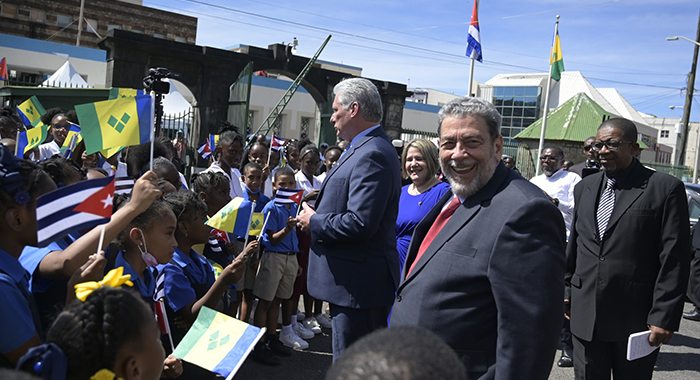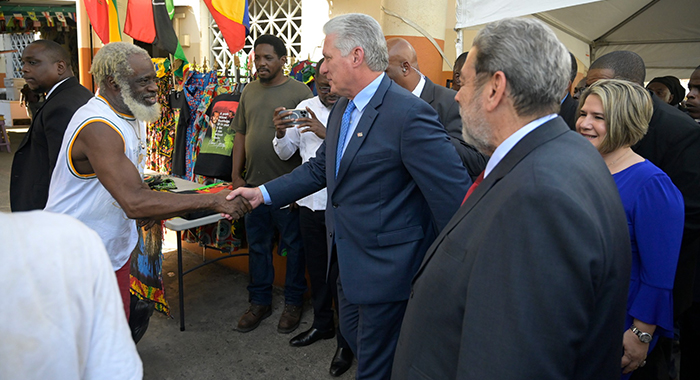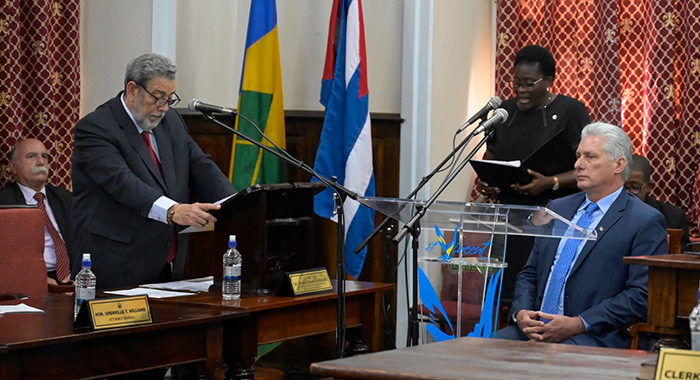The official visit to St. Vincent and the Grenadines of Miguel Diaz-Canel, the first Cuban president to do so, “is an occasion of enormous political, diplomatic, and practical significance,” Prime Minister Ralph Gonsalves told Parliament on Monday.
“This small country, St. Vincent and the Grenadines, a magnificent component of our Caribbean civilisation, stands askance against those who seek to enthrone imperialism, hegemony, and anti-people backwardness,” Gonsalves told a special sitting of the national assembly to mark the occasion.
Diaz-Canal ended on Monday a three-day official visit to SVG, 30 years after the establishment of formal Kingstown-Havana, on May 6, 1992.
“Undoubtedly, your visit to us will strengthen, indeed fortify, immeasurably, the already excellent relations which exist between our two countries,” Gonsalves said.
Gonsalves, a staunch supporter and defender of Cuba, said the bonds of friendship between both country “are grounded in high principle, mutual respect, multilateralism, the fundamental tenets of the Charter of the United Nations, our Caribbeanness, and our strivings for peace, justice, security, and prosperity for all.”
He added:
“Differences in our political and economic systems have never hampered us in the building of our ties that bind.”
Gonsalves noted that on Tuesday, in Barbados, at the 8th Cuba-CARICOM Summit, the bloc marks the 50th anniversary of the establishment of diplomatic relations between Cuba and the then four independent English-Speaking Caribbean countries — Barbados, Guyana, Jamaica, and Trinidad and Tobago.
He commended the Sir James Mitchell administration for establishing formal SVG-Cuba ties, but pointed out that since the late 19th century into the early 20th century there were people-to-people connections between the two countries.
“Significant migration of Vincentian workers to Cuba, particularly for the sugar industry, occurred,” he said, noting that the father of the celebrated Cuban heavyweight boxer, Theophilo Stephenson, was such a migrant, hailing from Biabou, community in eastern St. Vincent.
He said that many children, grandchildren, and great grandchildren born in Cuba of Vincentian migrants have now chosen to come to SVG to live and work, “but they have not abandoned their commitment to Cuba and its Revolution”.
He sad that the spouses of Vincentians who went to Cuba from the late 1970s onwards, are living and working in SVG with their respective husbands or wives.
“A people-to-people linkage has evolved markedly, and beautifully,” Gonsalves said.

He said that from the 1960s onwards, anti-Cuban sentiment in the Caribbean was “hugely manufactured, propagated, and encouraged by imperialism and its regional allies, particularly after the Bay of Pigs invasion by mercenaries and assorted anti-revolutionary Cubans in Miami backed by the United States of America and after, too, Fidel’s declaration in April 1961 of the socialist character of the Cuban Revolution.
“Independent and revolutionary Cuba was thus drawn into the vortex of the bi-polar Cold War.
Gonsalves said that in SVG, it was not until the early-to-mid 1970s, and thereafter, that “anti-imperialist organisations and parties” such as the Youlou Liberation Movement, the United People’s Movement, the Movement for National Unity and personalities therein, “began a concerted push-back against imperialism’s jaundiced mantras on revolutionary Cuba.
“This anti-imperialist rebuff of the Americans’ narrative on Cuba was paralleled across our region, bolstered by the selflessness and successes of revolutionary Cuba and growing Latin American solidarity.”
He said the election of his Unity Labour Party (ULP) government in March 2001 “heralded a massively ramped-up, many-sided bundle of relations between St. Vincent and the Grenadines and Cuba”.
Gonsalves pointed out that in September 2001, he led a governmental, business, and cultural delegation to Cuba within a week or so of the terrorist attack on the United States.
“The perennial critics at home, in orchestration with imperialism abroad, questioned the timing of our visit to Cuba so close to the terrorist attack on the Twin Towers in New York City. They posed the absurd and irrelevant query: ‘What would America say?’ This nonsensical, pro-imperialist question ignored the fact that Fidel himself had promptly condemned this act of terrorism.”
Gonsalves said that between September 2001 and now, SVG relations with Cuba have grown by leaps and bounds.
He said g the centre-pieces of these enhanced relations of immense practical benefit to SVG include the establishment of embassies in both countries with resident ambassadors, extensive collaboration in the fields of education, health, agriculture, construction, sports and culture.
“Notably in health, Cuban doctors, nurses and other health professionals have become embedded in the delivery of health in St. Vincent and the Grenadines,” Gonsalves said.
He noted that Cuban professionals designed, assisted in the construction, and currently in substantial staffing, of the Modern Medical and Diagnostic Centre (MMDC) in Georgetown.
“And the “Vision Now” programme saw thousands of Vincentians of all walks of life being transported to Cuba for eyecare, including corrective surgeries, all at no cost to our people.
“Truly, this has been, and is, Christianity in action!”
He said that in the area of construction, the monumental achievement is the historic Argyle International Airport (AIA).
“Undoubtedly without the support of Cuba and Venezuela it would have been impossible to proceed,” he said, adding that considerable assistance from Trinidad and Tobago and Taiwan, among other countries, was also vital. I
He said that in the Caribbean and Latin America, Cuba, SVG and like-minded countries have worked assiduously to deepen regional integration and to strengthen the functioning of the Association of Caribbean States; to establish the Bolivarian Alternative for Our America; “and to fashion a broad-based political umbrella known as the Community of States of Latin America and the Caribbean (CELAC) — outside of the clutches of North America in the hemispheric Organisation of American States (OAS)”.

He said that globally, Cuba and SVG are on the same page in the defence of the Charter of the United Nations and in the vanguard of advocating reform of the United Nations Security Council.
He said both countries work closely with one another at the United Nations and its agencies, in the Non-Aligned Movement; in GRULAC, and in the G77.
“We are at one, too, on the existential issues of climate change and global justice for all, including reparations for native genocide and the enslavement of African bodies in our America and elsewhere.”
Gonsalves said SVG “unequivocally rejects and condemns the persistent efforts of the United States of America to interfere and intervene in the internal affairs of Cuba”.
He said SVG stands with the overwhelming majority of the member-states of the United Nations, including traditional friends of the United States, in the denunciation of “the criminal economic embargo, the illegal, unilateral sanctions against Cuba, and the absurd declaration of Cuba as a state-sponsor of terrorism”.
The prime minister said Cuba has been a victim of terrorism, supported by agencies of the US government, as for example, the blowing-up of the Cubana aircraft off the coast of Barbados in October 1976, and the hundreds of assassination attempts against the Cuban leaders, especially Fidel Castro.
“St. Vincent and the Grenadines considers it unacceptable in international law, and immoral, for the USA to label the Cuban internationalist brigades of doctors, nurses, engineers, and other professionals to be victims of human trafficking. In this absurd way, the USA unwittingly devalues the genuine fight against human trafficking globally,” Gonsalves said, repeating a point he made one day earlier.
He said that as he has made it repeatedly clear in regional and global fora, although SVG and the United States have close economic, political, and people-to-people links, “our country cannot reasonably be expected to have its foreign policy in relation to Cuba determined or constrained by the presidential, senatorial, congressional, and gubernatorial politics of South Florida.
“It is high time that the USA effect an appropriate rapprochement with Cuba on the basis of mutual respect and dignity as befitting the peoples and governments of two great countries — Cuba and America. Such an eventuality would greatly please St. Vincent and the Grenadines. After all, we are friends of all; and we strive for a better world.”
He said the foregoing issues and considerations have helped to shape the discussions between the SVG-Cuba delegations ,during the official visit.
“St. Vincent and the Grenadines reaffirms its commitment to fortifying further Cuba-SVG relations in every material particular,” Gonsalves said and went on to quote Cuban revolutionary patriot and national hero, José Marti’s 1891 essay, “Our America”.
Gonsalves said:
“Ideas, my friends, my colleagues, are of inestimable value. The principal one, in our context, is that of solidarity — solidarity with and among people within our nations, and between like-minded nations, around the banner of peace, justice, prosperity, security, and sustainable development for all, not for a few and not for only a few in rich, powerful nations.
“Long live the internationalist solidarity between revolutionary Cuba and St. Vincent and the Grenadines. Long Live!”






